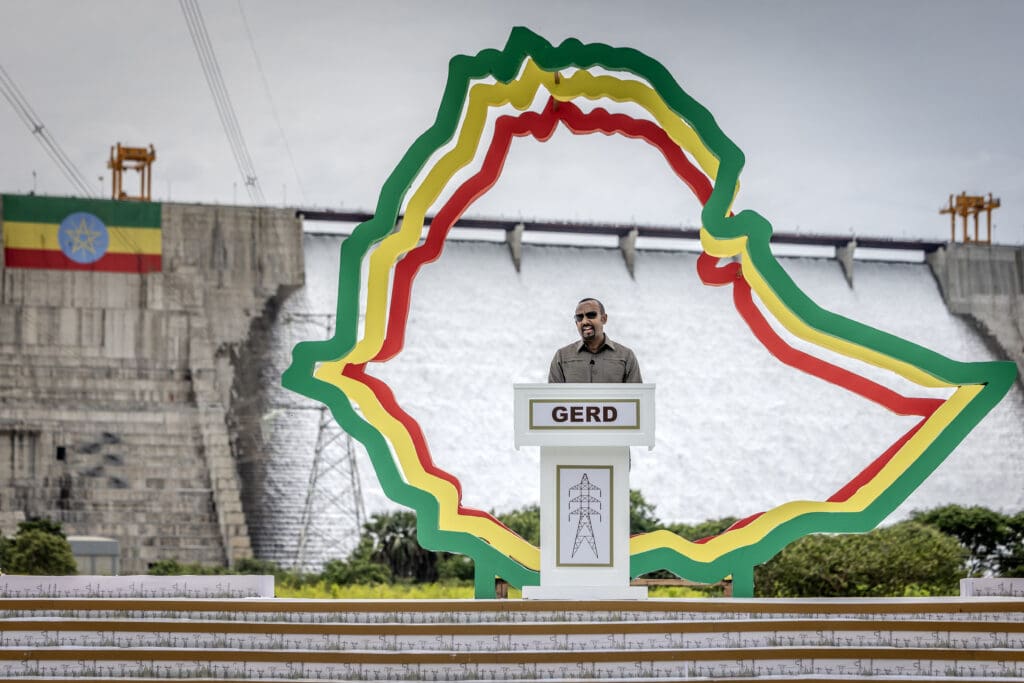After years of mounting tensions between Nile River Basin countries over Ethiopia’s plans to build the Grand Ethiopian Renaissance Dam (GERD) far upstream, the project was finally inaugurated on September 9 without a new agreement in place for the distribution of the Nile’s vital water resources. For Egypt and Sudan, who are downstream from the dam, the ongoing dispute with Ethiopia over water is perceived as an existential crisis that also alters the balance of power in the region.
The GERD has ended Egypt’s longstanding protected position over the distribution of the Nile water, in which it essentially held a monopoly, and Ethiopia’s move to impede its flow has shifted the political center of gravity upstream. Indeed, water plays a central role in Ethiopia’s approach to regional influence and internal legitimacy, something that Prime Minister Abiy Ahmed has doubled down on since coming to power in 2018. The GERD reflects this strategy, combining Ethiopia’s ambitions for electricity generation, economic growth, and broader geopolitical standing. The project is also linked to Ethiopia’s pursuit of Red Sea access, which was severed by Eritrea’s independence in 1993 but has recently resurfaced as a national priority.
While the GERD is a major infrastructural achievement, its impact extends beyond power generation and development. Ethiopia’s intertwining of domestic ambitions and regional aspirations sets the stage for new frictions with neighbors and external actors alike.
Egypt’s Vulnerability
The Nile plays a central role in shaping life and grievances across Nile Basin countries, where for centuries civilizations were built and have flourished along its banks. Nearly all of Egypt’s population lives along the Nile, and over 90 percent of its freshwater comes from the river. Any upstream changes have immediate consequences for water availability, agriculture and infrastructure. In 2010, Egypt rejected the Cooperative Framework Agreement (CFA), also known as the Entebbe Agreement, which sought to redefine the principle of “equitable use.” Cairo argued that it violated the 1929 and 1959 Nile Water Agreements, which gave Egypt and Sudan fixed quotas and even veto power over upstream projects. On the other hand, Ethiopia believes that these colonial era agreements excluded it from the equitable use of the Nile’s waters.
Without recognition of its historical rights, Egypt perceives itself as highly vulnerable to any changes upstream, especially given its rapid population growth and the added stress of climate change. Under the 1959 Nile Waters Agreement, Egypt is allocated 55.5 billion cubic meters annually, though its actual needs are now approximately 114 billion cubic meters annually. This growing gap highlights why Egypt perceives any dilution of its treaty rights as an existential threat and a national security issue. The shortfall has already forced Cairo to adopt alternative strategies to address scarcity, but these measures only partially offset the growing demand.
In recent years, Egypt has taken steps to reduce its vulnerability to external threats and manage water scarcity. These include building water treatment plants, expanding desalination projects and reducing the cultivation of water-intensive crops. Still, the lack of a binding agreement on Nile flows during drought seasons leaves Egypt exposed. Cairo has repeatedly called for a legal framework that guarantees minimum releases and ensures coordination during dry years. These demands have become the core of Egypt’s negotiating position and a central fault line in the talks.
Egypt maintains that protecting its water interests does not conflict with Ethiopia’s development goals, provided that all parties respect the legal principles governing transboundary rivers, including equitable use and the duty to prevent significant harm. It has described Ethiopia’s unilateral actions as violations of these principles and has warned that any further disruptions may prompt legal and diplomatic action under international law. Using force to sabotage the GERD is unlikely at this point, despite previous hyperbolic statements by Egyptian lawmakers in 2013.
GERD is Essential for Ethiopia’s State-Building Under Abiy
While external talks remain gridlocked, understanding Ethiopia’s approach requires a look at how water infrastructure has long been woven into its state-building project.
In the 1960s, Emperor Haile Selassie promoted modernization projects such as the Koka Dam, while the Derg’s state-led water management efforts saw limited success. In the 2000s, the Ethiopian People’s Revolutionary Democratic Front (EPRDF) expanded hydroelectric capacity with projects like the Tekeze and Gilgel Gibe III dams, but the GERD surpasses all previous initiatives in both scale and significance.
Initiated in 2011, the GERD is more than a domestic infrastructure project; it is a cornerstone of Ethiopia’s geopolitical strategy and a rallying cry for national unity. The dam is expected to double Ethiopia’s electricity generation, fueling economic development and industrial expansion. It also symbolizes Ethiopia’s determination to overcome historical grievances. Since the first turbine came online in 2022, GERD’s electricity production has steadily expanded and when all turbines come online, its capacity will reach 5,150 megawatts, making it one of the twenty largest hydroelectric dams in the world.
Domestically, the government framed the dam as a testament to Ethiopian resilience and self-reliance, mobilizing public support through bond sales and crowdfunding while using the project to solidify legitimacy and rally nationalist sentiment. This narrative strengthened national pride and portrayed the previous ruling party, EPRDF, as a driving force for Ethiopia’s modernization. Domestically, the government framed the dam as a testament to Ethiopian resilience and self-reliance, mobilizing public support through bond sales and crowdfunding while using the project to solidify legitimacy and rally nationalist sentiment. This narrative strengthened national pride and portrayed the previous ruling party, EPRDF, as a driving force for Ethiopia’s modernization. Similarly, since the Prosperity Party took power, it has used the dam and other large scale infrastructure projects to galvanize local support and reinforce local and regional legitimacy.
Ethiopia’s vision, however, extends beyond national symbolism and local development. The GERD is central to its plan to expand electricity exports to neighboring states, including Kenya, Djibouti, Sudan and South Sudan, allowing it to advance economic integration and enhance regional influence.
Failure of Mediation and the Way Forward
Over the past decade, talks over the dam, led by the African Union, the European Union and the U.S., among others, have failed to produce a binding agreement. Ethiopia prefers a flexible and sovereign approach to dam management while Egypt insists on fixed legal guarantees. Sudan, embroiled in civil war, has taken a backseat in recent negotiations while experiencing Nile floods in recent years.
The central unresolved issue is how to manage drought periods. In early 2020, during talks in Washington, mediators proposed mitigation measures for dry years and prolonged droughts. The proposal included minimum release rules to safeguard downstream flows, while still allowing Ethiopia to generate most of its planned hydropower. Egypt and Sudan endorsed the draft, but Ethiopia ultimately pulled out. Egyptian officials claimed that Ethiopia considered the mechanism too restrictive, while Addis Ababa argued that the mediators themselves were biased in favor of Cairo. The collapse of these talks set the tone for subsequent negotiations, characterized by growing mistrust and the absence of workable drought provisions.
By 2023, after several more fruitless rounds, Egypt declared the GERD track had reached a dead end, blaming Ethiopia’s persistent rejection of legal and technical mechanisms. This sense of stalemate deepened Ethiopia’s skepticism of outside mediation, which only worsened in 2025 when President Donald Trump claimed the dam was built “with United States money, largely,” a statement Ethiopian officials publicly rejected as false and damaging. With Washington no longer seen as a neutral broker, and regional and multilateral initiatives similarly stalled, the dispute has been left without a viable forum for resolution.
The two countries will ultimately need to sit down and negotiate a path forward directly. External support may help facilitate that process, but any durable outcome depends on Egypt and Ethiopia finding common ground themselves. With the GERD inaugurated and the diplomatic track stalled, there is an urgent need for more credible third-party mediators who can help rebuild trust between Egypt and Ethiopia. Countries like Türkiye, the United Arab Emirates or Saudi Arabia, which have regional ties and economic leverage, may be better positioned to help reestablish and stabilize the diplomatic channel and support future efforts.
The political choices at the heart of the dispute continue to block agreement. Both sides need to engage in good faith with the new realities. A workable framework must begin with establishing trust, and focusing on narrow, practical goals, such as coordinating during drought years, sharing real time data and establishing limits on unilateral action. Anything broader, or an all-at-once agreement, risks collapsing under the weight of politics.



